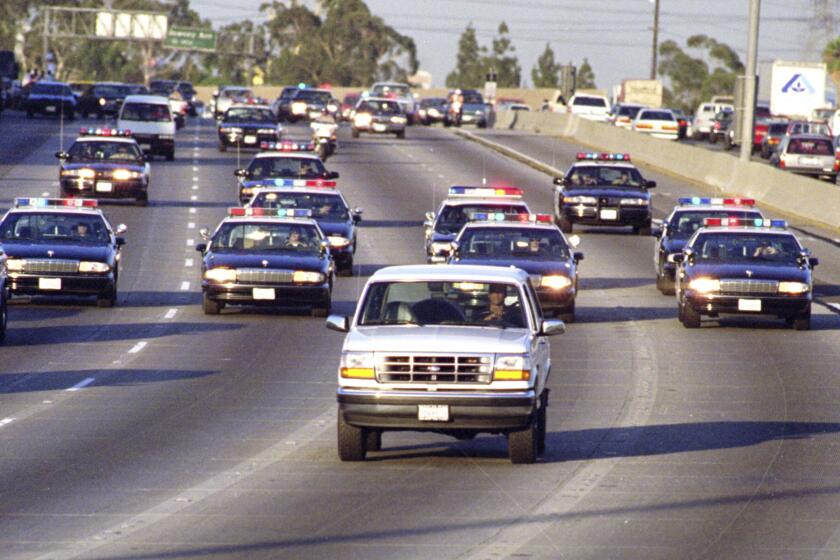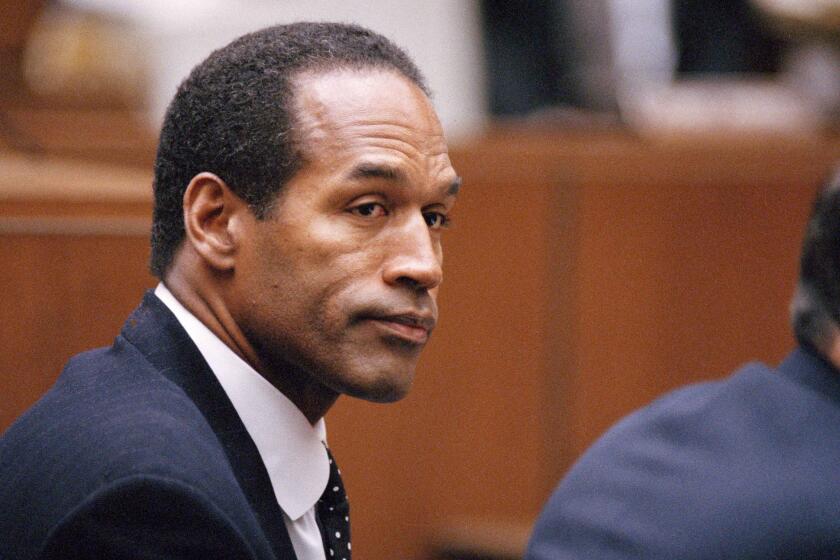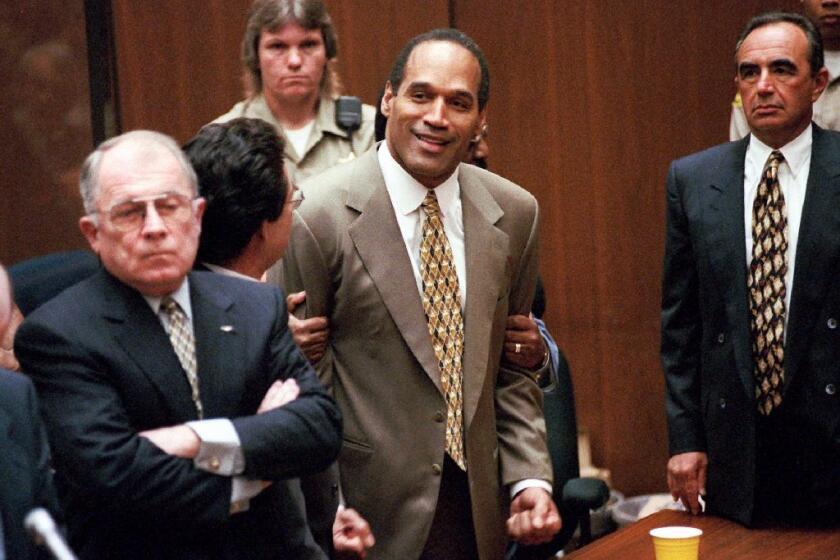Opinion: How Rodney King helped O.J. Simpson win a not-guilty verdict

- Share via
In 1994 and 1995, when lawyers for O.J. Simpson offered up the possibility that the former football star was being framed by the Los Angeles Police Department for the murders of his ex-wife, Nicole Brown Simpson, and Ron Goldman, it should have seemed outlandish.
Consider the complications in such a frame. If officers planted a glove, say, only to discover that Simpson’s whereabouts were accounted for at the time of the murder, attention would immediately swing to who it was that discovered that glove. Framing is not just a vile business, but a difficult one. That’s at least partly why it’s rare.
Realizing that, the defense covered its bases. It put forward the possibility that investigators had “rushed to judgment” or that sloppy handling of evidence had tainted it beyond utility. The LAPD, in other words, was presented as either cunningly evil, stubbornly closed-minded or sloppy and careless.
O.J. Simpson, whose rise and fall from American football hero to murder suspect to prison inmate fueled a public drama that obsessed the nation, has died.
What’s most shocking is that when Simpson was tried and found not guilty, all of those accusations were, for a Los Angeles jury, potentially believable.
The LAPD in 1994 had largely forfeited the trust of the city it was sworn to protect and serve. The beating of Rodney King in 1991, the riots that followed the acquittals of those officers in 1992 and the abject failure of the department to contain those riots all left the LAPD’s standing in Los Angeles in tatters by the time Goldman and Nicole Brown Simpson were slashed and stabbed to death.
In the aftermath of the King beating and the riots, Los Angeles invested much energy into police reform, an extended process that stretched across years of ballot measures and municipal investments.
O.J. Simpson’s white Bronco chase on weirdly empty freeways in Los Angeles became an indelible memory and ‘locked people into this common emotional experience.’
The Christopher Commission uncovered evidence of racism and excessive force and advanced a reform agenda that reshaped department training, discipline and officer tracking, as well as imposing term limits for the chief of police. After the riots, the Webster Commission focused attention on the need to modernize emergency operations and invest in basic patrol services.
Separately, the Kolts Commission probed the Los Angeles County Sheriff’s Department and found similar patterns of excessive force, paving the way for the creation of a new police monitoring structure — civilian oversight — under the capable leadership of Merrick Bobb.
Together, those moves ushered in a reform era that vastly improved policing in Southern California and proved that responsible policing enhances public safety. And that reform movement, though still a work in progress, has spread to other cities as well.
In a lot ways, many of us remain locked in our bubbles, not entirely understanding the thought processes of people of other races and ethnicities.
The Simpson case, however, demonstrated another aspect of the urgent need for police reform. Not only did malevolent police practices and inadequate efforts to root out corruption and brutality threaten the safety of suspects, they subverted justice. Put another way, when the public distrusts police officers, criminal defendants benefit.
In the Simpson case, recall the role of Detective Mark Fuhrman. The telegenic cop appeared at the preliminary hearing and, even though he played a very small and passing part in the actual investigation, became for a time the face of the LAPD in its case against Simpson.
Then, a few months later, a set of tapes surfaced in which Fuhrman could be heard boasting of his machismo and racism to an aspiring screenwriter. On the tapes, Fuhrman tossed around the “N-word” (that phrase got a push in the hearings leading up to Simpson’s trial, as defense lawyer Johnnie L. Cochran Jr. and prosecutor Chris Darden sparred over questioning Fuhrman about it) and lived down to every preconception about racist, brutal LAPD officers.
The Goldman family waged a nearly 30-year battle with O.J. Simpson, who they say killed Ron Goldman. Here is how they reacted to his death.
Then, when Fuhrman took the stand during the trial and was asked whether he had ever used the “N-word,” he took the Fifth. Fuhrman’s fellow detectives, the ones who actually investigated the murder, hung their heads in disgust.
The effect on the jury was inescapable. Whatever one thinks about Simpson’s guilt or innocence in the double murder, it’s easy to understand why jurors in the case would have questions — even doubts — about a case investigated by officers whose colleagues had beaten Rodney King and by a detective whose racism was something he bragged about. The LAPD had forfeited its presumption of honesty.
That cost the LAPD and the city untold money and safety. How many witnesses to how many crimes did not come forward in those years because they did not trust police? How many cases were lost because jurors did not believe police testimony?
We’ll never know the answers to those questions. They are a reminder that police reform was needed not just to protect those who had contact with LAPD officers or sheriff’s deputies but also to establish a more just and safe community.
Los Angeles suffered as a result of the collapse in law enforcement confidence here. Well, not all of L.A. It did help O.J. Simpson.
Jim Newton is an author and journalist who teaches and edits Blueprint magazine at UCLA. He was The Times’ lead reporter on the murder trial of O.J. Simpson in 1994 and 1995.
More to Read
Updates
8:36 a.m. April 12, 2024: An earlier version of this piece said the jury exonerated O.J. Simpson; it more precisely found him not guilty.
A cure for the common opinion
Get thought-provoking perspectives with our weekly newsletter.
You may occasionally receive promotional content from the Los Angeles Times.














